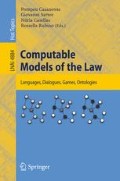Abstract
In AI approaches to argumentation, different senses of argument are often conflated. We propose a three-level distinction between arguments, cases, and debates. This allows us to modularise issues into separate levels and identify systematic relations between levels. Arguments, comprised of rules, facts, and a claim, are the basic units; they instantiate argument schemes; they have no sub-arguments. Cases are sets of arguments supporting a claim. Debates are sets of arguments in an attack relation; they include cases for and against a particular claim. Critical questions, which are characteristic of the particular argument schemes, are used to determine the attack relation between arguments. In a debate, rankings on arguments or argument relations are given as components based on features of argument schemes. Our analysis clarifies the role and contribution of distinct approaches in the construction of rational debate. It identifies the source of properties used for evaluating the status of arguments in Argumentation Frameworks.
Access this chapter
Tax calculation will be finalised at checkout
Purchases are for personal use only
Preview
Unable to display preview. Download preview PDF.
References
Reed, C., Rowe, G.: Araucaria: Software for argument analysis, diagramming and representation. International Journal on Artificial Intelligence Tools 13(4), 961–980 (2004)
Hunter, A.: Making argumentation more believable. In: [15], pp. 269–274
Hunter, A.: Towards higher impact argumentation. In [15], pp. 275–280
Caminada, M., Amgoud, L.: An axiomatic account of formal argumentation. In: Veloso, M.M., Kambhampati, S. (eds.) Proceedings of The Twentieth National Conference on Artificial Intelligence, Pittsburgh, Pennsylvania, USA, July 9-13, 2005, pp. 608–613. AAAI Press/The MIT Press, Cambridge (2005)
Cayrol, C., Lagasquie-Schiex, M.C.: On the acceptability of arguments in bipolar argumentation frameworks. In: Godo, L. (ed.) ECSQARU 2005. LNCS (LNAI), vol. 3571, pp. 378–389. Springer, Heidelberg (2005)
Walton, D.: Argumentation Schemes for Presumptive Reasoning. Erlbaum, Mahwah (1996)
Dung, P.M.: On the acceptability of arguments and its fundamental role in nonmonotonic reasoning, logic programming and n-person games. Artificial Intelligence 77, 321–358 (1995)
Toulmin, S.: The Uses of Argument. Cambridge University Press, Cambridge (1958)
Pollock, J.: Defensible reasoning with variable degrees of justification. Artificial Intelligence 133, 233–282 (2001)
Prakken, H.: Logical Tools for Modelling Legal Argument. Kluwer Academic Publishers, Dordrecht (1997)
Amgoud, L., Cayrol, C.: Inferring from inconsistency in preference-based argumentation frameworks. J. Autom. Reason 29(2), 125–169 (2002)
Bench-Capon, T.J.M.: Persuasion in practical argument using value-based argumentation frameworks. J. Log. Comput. 13(3), 429–448 (2003)
Atkinson, K.: What Should We Do?: Computational Representation of Persuasive Argument in Practical Reasoning. PhD thesis, Department of Computer Science, University of Liverpool, Liverpool, United Kingdom (2005)
Ashley, K.: Modeling Legal Argument: Reasoning with Cases and Hypotheticals. Bradford Books/MIT Press, Cambridge (1990)
McGuinness, D.L., Ferguson, G.: Proceedings of the Nineteenth National Conference on Artificial Intelligence, Sixteenth Conference on Innovative Applica tions of Artificial Intelligence, July 25-29, 2004. AAAI Press / The MIT Press, San Jose (2004)
Author information
Authors and Affiliations
Editor information
Editors and Affiliations
Rights and permissions
Copyright information
© 2008 Springer-Verlag Berlin Heidelberg
About this paper
Cite this paper
Wyner, A.Z., Bench-Capon, T.J.M., Atkinson, K. (2008). Three Senses of “Argument”. In: Casanovas, P., Sartor, G., Casellas, N., Rubino, R. (eds) Computable Models of the Law. Lecture Notes in Computer Science(), vol 4884. Springer, Berlin, Heidelberg. https://doi.org/10.1007/978-3-540-85569-9_10
Download citation
DOI: https://doi.org/10.1007/978-3-540-85569-9_10
Publisher Name: Springer, Berlin, Heidelberg
Print ISBN: 978-3-540-85568-2
Online ISBN: 978-3-540-85569-9
eBook Packages: Computer ScienceComputer Science (R0)

